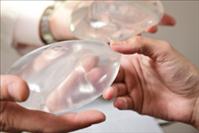 Digital News Report – The US Food and Drug Administration (FDA) has had manufacturers of breast implants conduct long-term studies with women who have silicone gel-filled breast implants. In 2010, there were 296,203 breast augmentation procedures and 93,083 breast reconstruction procedures in the United States, according to the American Society of Plastic Surgeons National Clearinghouse of Plastic Surgery Procedural Statistics. The new report by the FDA shows that they still consider the silcone breast implants as safe, however the longer they are in the patient, the higher the risk for complications.
Digital News Report – The US Food and Drug Administration (FDA) has had manufacturers of breast implants conduct long-term studies with women who have silicone gel-filled breast implants. In 2010, there were 296,203 breast augmentation procedures and 93,083 breast reconstruction procedures in the United States, according to the American Society of Plastic Surgeons National Clearinghouse of Plastic Surgery Procedural Statistics. The new report by the FDA shows that they still consider the silcone breast implants as safe, however the longer they are in the patient, the higher the risk for complications.
The reason for the extra research was to better understand the safety of silicone breast implants. They first gained FDA approval in 1962, but in the late 1980’s, safety concerns began to surface for silicone implants. In 2000, saline filled breast implants became available. The safety studies are ongoing for silicone breast implants, but some of the preliminary results are being shared by the FDA. The finalized study results should be in 2012 after all patients in the study have been followed for ten years.
The FDA said that based on data so far they say, “silicone gel-filled breast implants have a reasonable assurance of safety and effectiveness when used as labeled.” However, the FDA also says that women are informed of the risks involved with silicone breast implants and complications increase the longer the women have them. There is also a slight increased chance for developing anaplastic large cell lymphoma with silicone implants. Women with breast implants will always have to monitor for complications the rest of their lives says the FDA.
Between 20 to 40 percent of augmentation patients and 40 to 70 percent of reconstruction patients will have additional surgeries within the first 8 to 10 years. The FDA said that routine replacement is not a requirement. The additional surgeries are often for modifying, removing, or replacing the implants.
The FDA does not see and noticeable relationship with silicone gel-filled breast implants and connective tissue disease, breast cancer, or reproductive problems. They caution that if there is an association, it could take several years to show up and is probably rare. They were not able to detect these associations with the data that is available.
Complications increase the longer the woman has the breast implants. Within 10 years there will be around one out of five first-time breast augmentation patients that will have complications that require the removal of the implant. Women that got primary reconstruction had a higher rate of one out of two requiring the implant to be removed in the 10-year period.
The most common complications and undesirable outcomes were capsular contracture, reoperation, removal of the implant, and implant rupture. Additionally, in the Allergan manufacturer’s study regular complications included asymmetry, scarring, and breast pain. Mentor’s study reported changes in nipple and breast sensation as common complications.
The FDA reported that complication rates increase the longer the implant is in the patient. Complications rates are dependent on the kind of surgery that is performed. Women that undergo revision augmentation and primary reconstruction have higher rates of complications than do those who undergo primary augmentation surgery.
|
|
|
|
|
|
|
32.4 percent (10 year) |
53.8 percent (10 year) |
20.8 percent (10 year) |
|
Mentor Memory Gel silicone breast implants |
|
23.3 percent |
7.3 percent |
The longer the women had the implants the higher the chance for complications and removal. In addition, some women in the study did not follow up so the data may be limited.
The FDA has a brochure that is available for women to understand breast implant complications with their Breast Implants Complications Booklet .
By: Jason Chang
